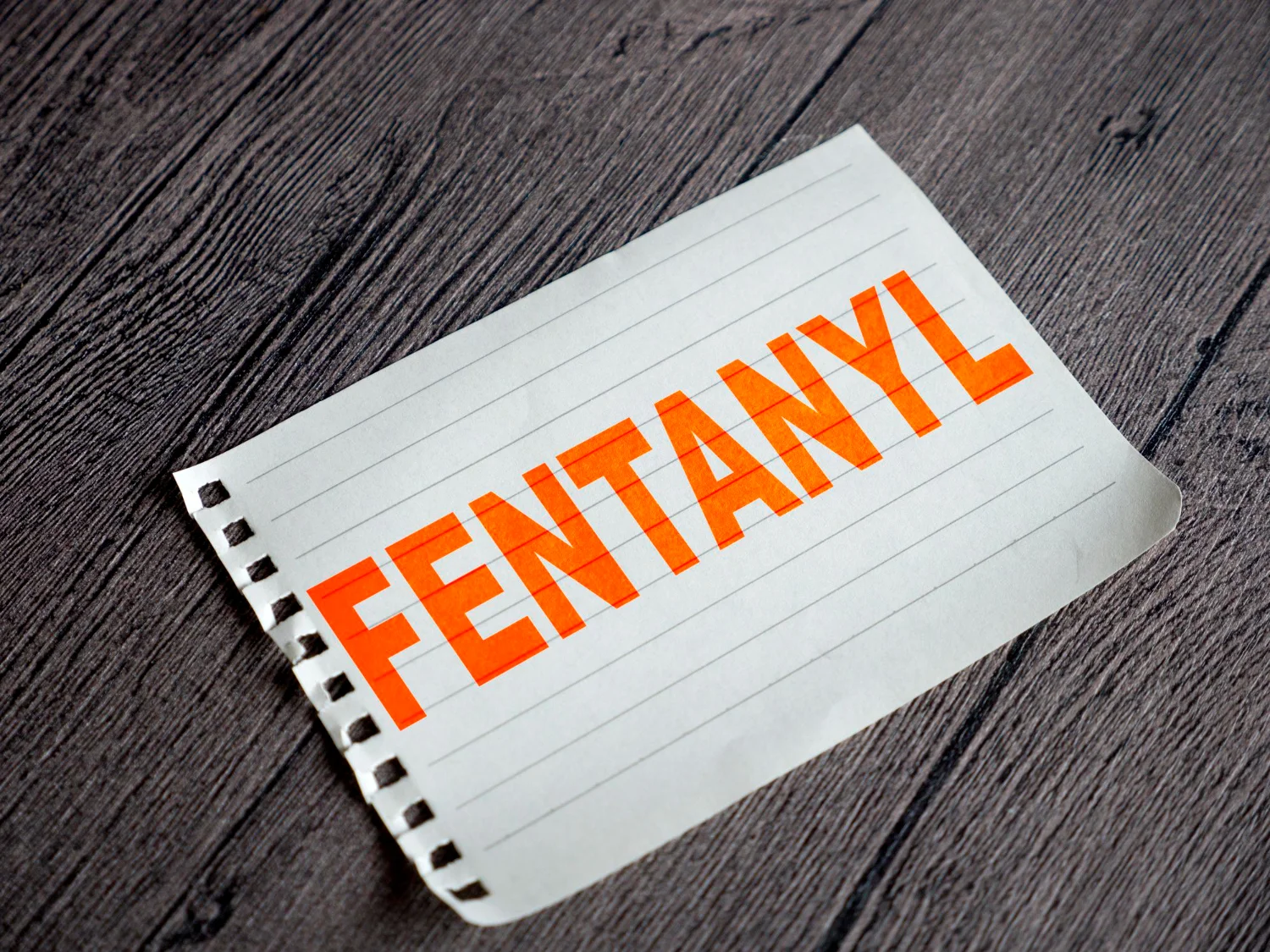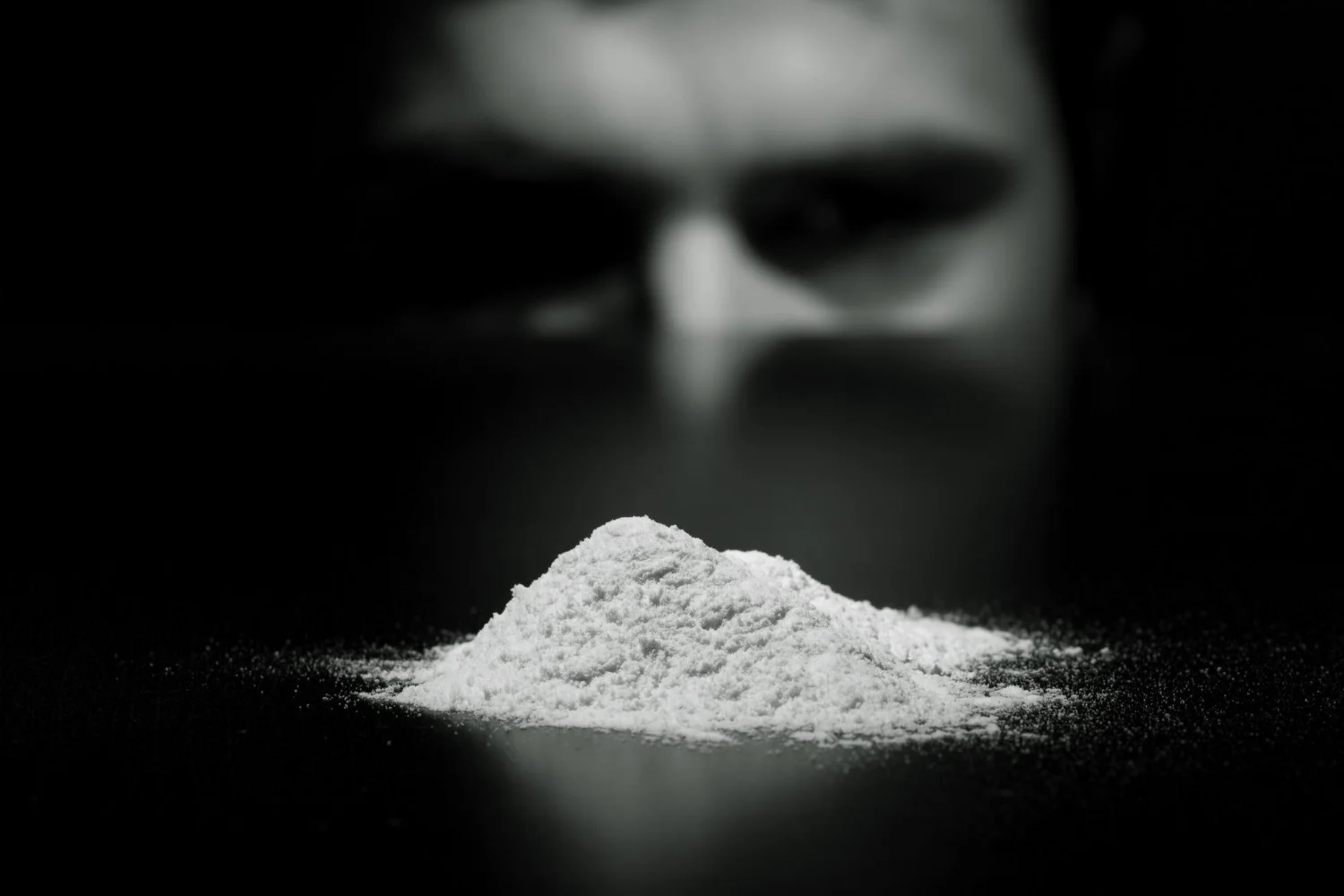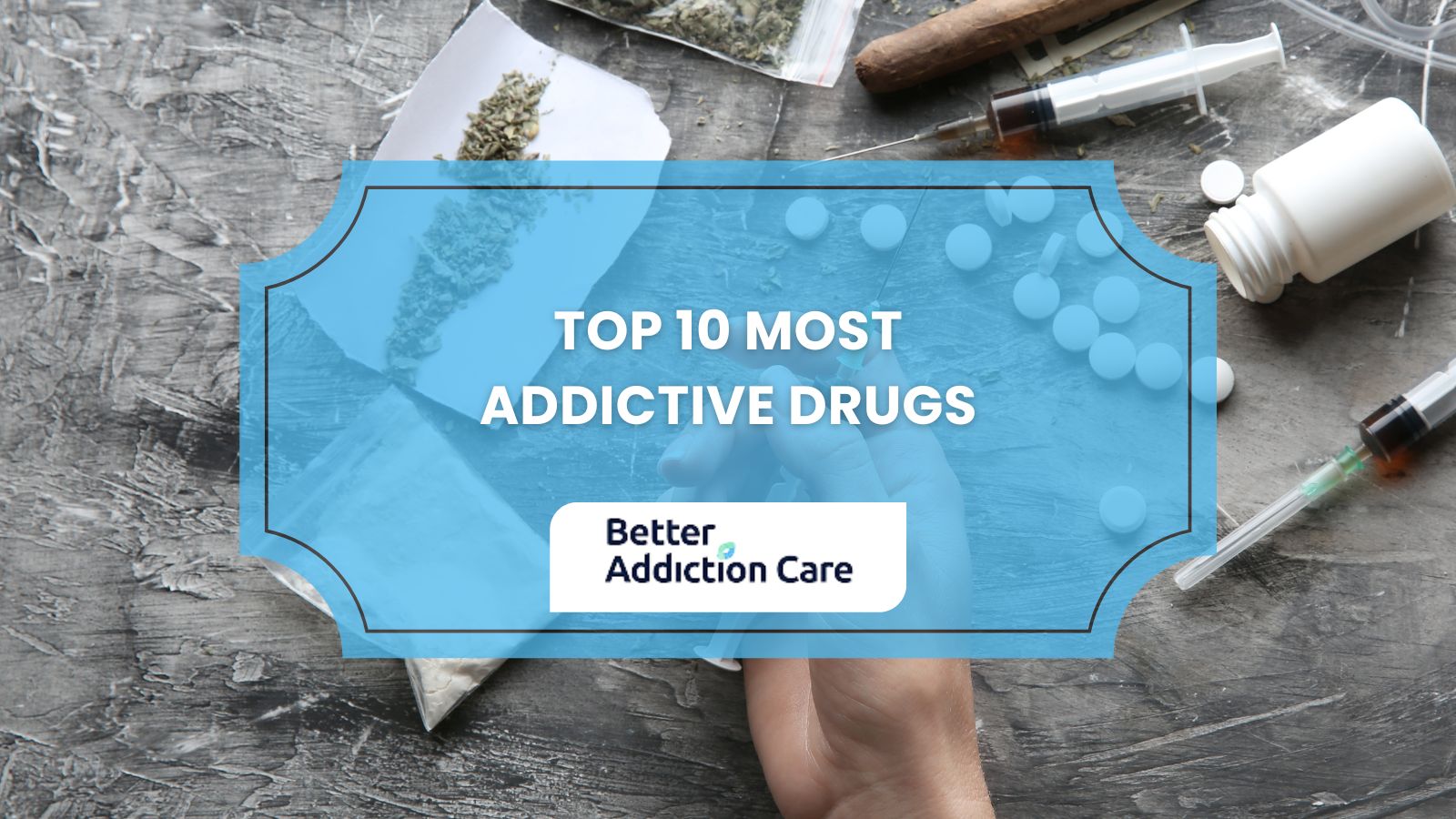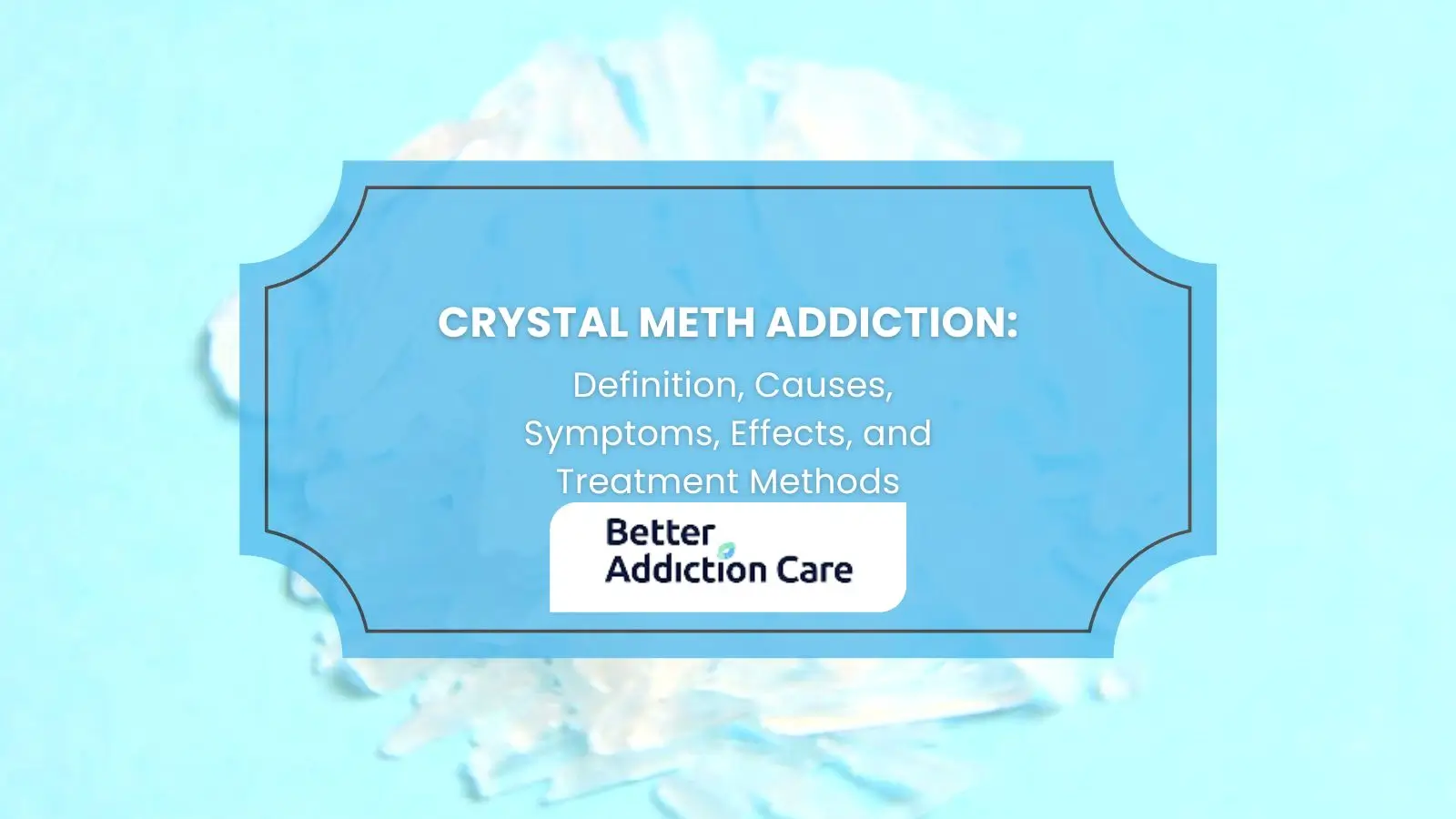NyQuil Addiction: Signs, Effects, Risks Factors, and Treatment Options
NyQuil addiction occurs when individuals misuse the over-the-counter medication for its sedative effects, particularly due to the presence of ingredients like diphenhydramine. Approximately 3.1% of individuals aged 12–25 report using products like NyQuil to achieve a high, according to a study by the National Institute on Drug Abuse titled "Monitoring the Future: National Survey Results on Drug Use," published in the National Institutes of Health (2021).
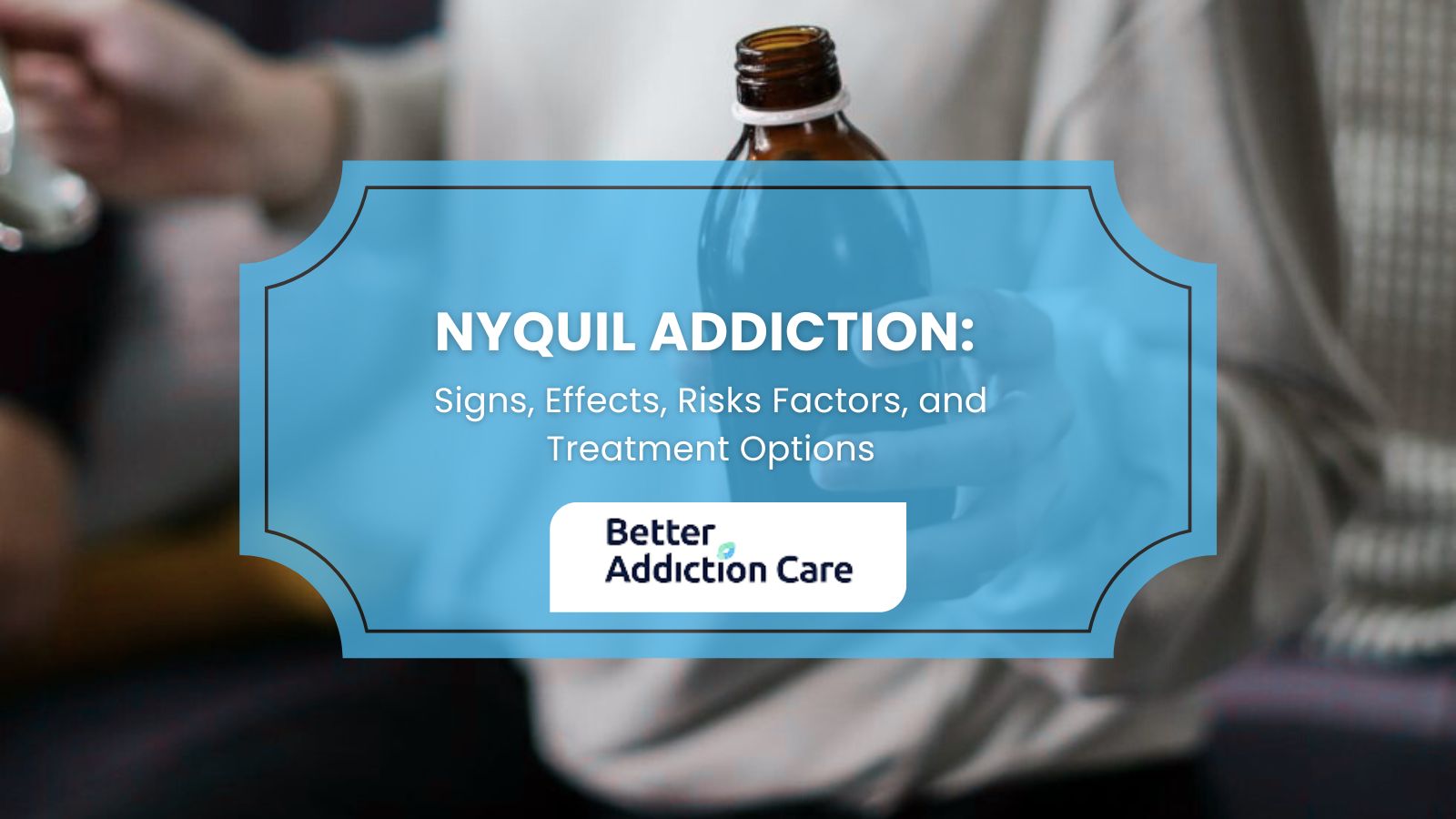
NyQuil addiction occurs when individuals misuse the over-the-counter medication for its sedative effects, particularly due to the presence of ingredients like diphenhydramine. Approximately 3.1% of individuals aged 12–25 report using products like NyQuil to achieve a high, according to a study by the National Institute on Drug Abuse titled "Monitoring the Future: National Survey Results on Drug Use," published in the National Institutes of Health (2021).
Signs of Nyquil addiction include using NyQuil beyond the recommended dosage, having cravings for it, and using it to cope with stress or sleep issues. Users also experience withdrawal symptoms like irritability and insomnia when they stop using the drug.
The effects of NyQuil addiction include impaired motor coordination, drowsiness, confusion, and long-term health risks such as liver damage from acetaminophen. Overuse also results in cognitive impairments and respiratory issues.
According to Tsuyoshi Minami's study "Multianalyte Sensing of Addictive Over-the-Counter (OTC) Drugs," published in the Journal of the American Chemical Society (2013), excessive use of NyQuil causes severe health complications, including liver damage from acetaminophen.
Risk factors of Nyquil addiction include a history of substance abuse, mental health disorders like anxiety and insomnia, and frequent self-medication with NyQuil to address these issues. Individuals who use NyQuil regularly for stress relief are more likely to develop an addiction.
Treatment for NyQuil addiction involves detoxification, inpatient or outpatient rehabilitation, and behavioral therapy. A combination of these treatments is key to addressing the psychological aspects of addiction and preventing relapse.
What is NyQuil Addiction?
NyQuil addiction is a condition that occurs when individuals misuse the over-the-counter medication, developing an intense craving despite its negative effects. This addiction is primarily driven by the presence of diphenhydramine, an antihistamine with sedative properties, and alcohol, which can amplify its effects.
The abuse of NyQuil develops over time as individuals seek its sleep-inducing qualities or use it to cope with stress and anxiety. When consumed in excess, NyQuil causes physical and psychological dependence due to its ability to alter the central nervous system, leading to tolerance and withdrawal symptoms.
The mechanism of action behind NyQuil addiction involves the way diphenhydramine and alcohol interact with the brain. Diphenhydramine blocks histamine receptors, inducing drowsiness, while alcohol can enhance this sedative effect.
According to a study published by the National Institute on Drug Abuse (2021), approximately 1.5 million people in the U.S. misuse over-the-counter cough and cold medications annually, with a significant portion of that number using products like NyQuil for its psychoactive effects.
People abuse NyQuil for its ability to induce a calming, sleep-inducing state, with some also seeking its euphoric effects. Individuals may misuse NyQuil to alleviate stress, manage insomnia, or self-medicate for mental health issues.
What is NyQuil?
NyQuil is an over-the-counter medication used to treat symptoms of the common cold and flu, such as cough, congestion, and sore throat. It contains a combination of active ingredients: diphenhydramine, acetaminophen, and phenylephrine. Diphenhydramine is the primary ingredient responsible for the sedative effects, while acetaminophen helps relieve pain, and phenylephrine reduces nasal congestion.
When taken as directed, NyQuil provides relief from cold symptoms and helps users sleep. However, excessive use leads to harmful side effects, such as dizziness, confusion, and liver damage from acetaminophen. NyQuil does not contain codeine, a controlled substance found in some prescription cough syrups.
NyQuil is legal to purchase without a prescription but is subject to age restrictions. In the U.S., individuals must be at least 18 years old to buy it due to its potential for misuse. It is similar to other cold and cough medicines but stands out for its sedative effects.
What is Nyquil Used For?
NyQuil is used for relieving common cold and flu symptoms, including cough, sore throat, congestion, and body aches. The combination of ingredients in NyQuil makes it effective for multiple symptoms.
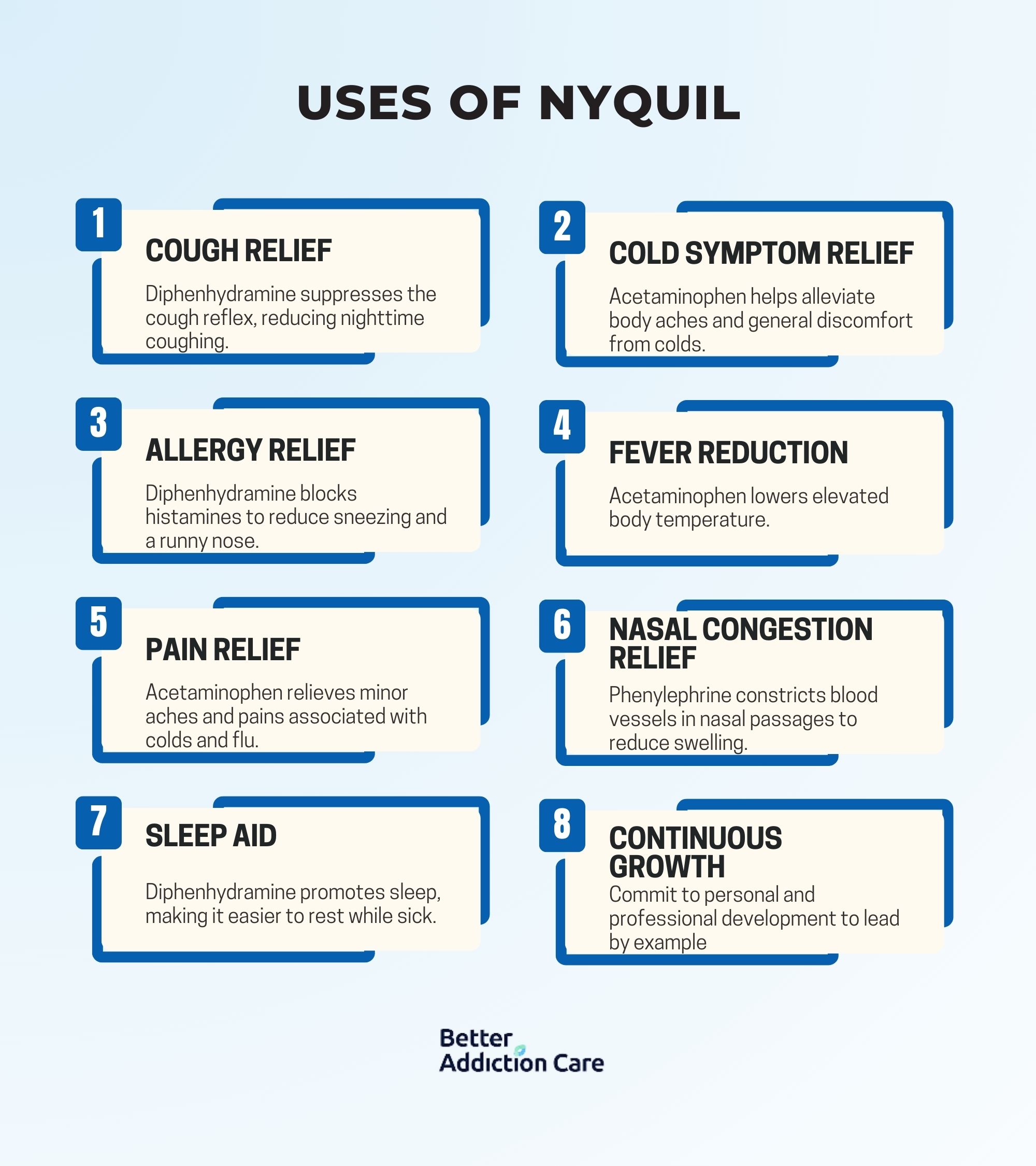
The main uses of NyQuil include:
-
Cough Relief: NyQuil helps relieve coughing, a common symptom of colds, through the action of diphenhydramine, which suppresses the cough reflex. This ingredient helps reduce the urge to cough and allows for better rest.
-
Cold Symptom Relief: The acetaminophen in NyQuil provides relief from general cold symptoms such as body aches and pains, making it easier for individuals to cope with the discomfort of a cold.
-
Allergy Relief: Diphenhydramine, an antihistamine, is effective in managing allergic reactions, such as a runny nose or sneezing, by blocking histamine receptors in the body that cause these symptoms.
-
Fever Reduction: Acetaminophen is also responsible for reducing fever, a common symptom during illnesses like the flu and colds, by lowering the body’s temperature when it's elevated.
-
Pain Relief: Acetaminophen is used in NyQuil to alleviate minor aches and pains associated with colds, flu, or other illnesses.
-
Nasal Congestion Relief: Phenylephrine, a decongestant, works to relieve nasal congestion by narrowing the blood vessels in the nasal passages, reducing swelling and making it easier to breathe.
-
Sleep Aid: Diphenhydramine serves as the sleep-inducing component in NyQuil, helping users fall asleep more easily, which is particularly beneficial for those suffering from cold symptoms that disrupt rest.
How Does Nyquil Addiction Develop?
NyQuil addiction develops when individuals misuse the medication for its sedative effects, particularly the ingredient dextromethorphan (DXM). DXM, when taken in high doses, produces euphoria and hallucinations, leading to dependence.
People use NyQuil as an alternative to other drugs, seeking relief from insomnia or stress. Over time, they develop tolerance, needing more to achieve the same effects. Genetics also plays a role, as some individuals may be more prone to addiction due to inherited factors that influence how the body responds to substances.
What are the Signs of NyQuil Addiction?
The signs of NyQuil addiction are frequent misuse of the medication, cravings for the drug, and using it despite negative consequences. Individuals also show withdrawal symptoms, such as irritability and difficulty sleeping, when not using NyQuil.
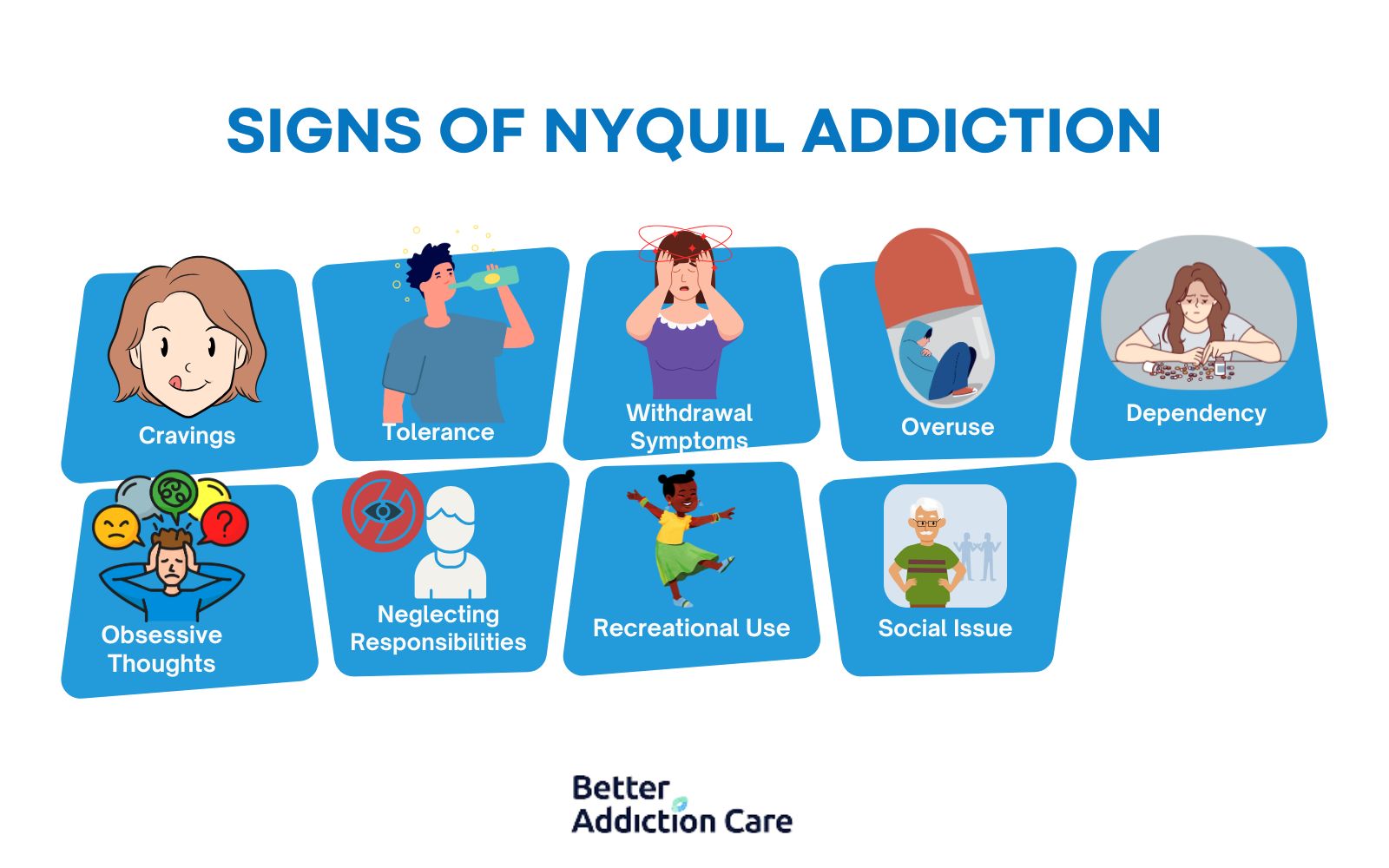
The main signs of NyQuil addiction are explained below:
-
Cravings: A strong desire to use NyQuil, leading to repeated misuse. This is a psychological sign and is severe if not addressed. According to the National Institute on Drug Abuse (2021), cravings are a common sign of addiction to both prescription and over-the-counter drugs, including NyQuil.
-
Tolerance: Needing more of the drug to achieve the same effects, which indicates physical dependency. Tolerance is a behavioral sign that escalates to dangerous levels.
-
Withdrawal: Symptoms such as irritability, insomnia, and anxiety when not using NyQuil. Withdrawal is a physical and psychological sign and signifies dependence. According to the National Institutes of Health (2021), withdrawal symptoms like these are commonly associated with the misuse of substances like NyQuil.
-
Overuse: Taking more NyQuil than recommended or using it more frequently than intended. This is a behavioral sign and results in significant health complications.
-
Obsessive Thoughts: Continuously thinking about NyQuil and its effects leading to compulsive use. This is a psychological sign of addiction.
-
Neglecting Responsibilities: Failing to meet daily responsibilities due to NyQuil use, such as skipping work or social engagements. This is a behavioral sign and significantly impacts a person’s life.
-
Recreational Use: Using NyQuil for non-medical purposes, such as to get high. This is a behavioral sign and indicates misuse.
-
Dependency: Relying on NyQuil to manage sleep or stress, showing physical and psychological dependence. This is both a psychological and behavioral sign.
-
Social Issues: Experiencing strained relationships or isolation due to NyQuil use. This is a behavioral sign and negatively affects one's social life.
What are the Effects of NyQuil Addiction?
The effects of NyQuil addiction are drowsiness, impaired motor coordination, liver damage, and respiratory problems. Long-term misuse leads to cognitive impairments, increased risk of overdose, and damage to the central nervous system.
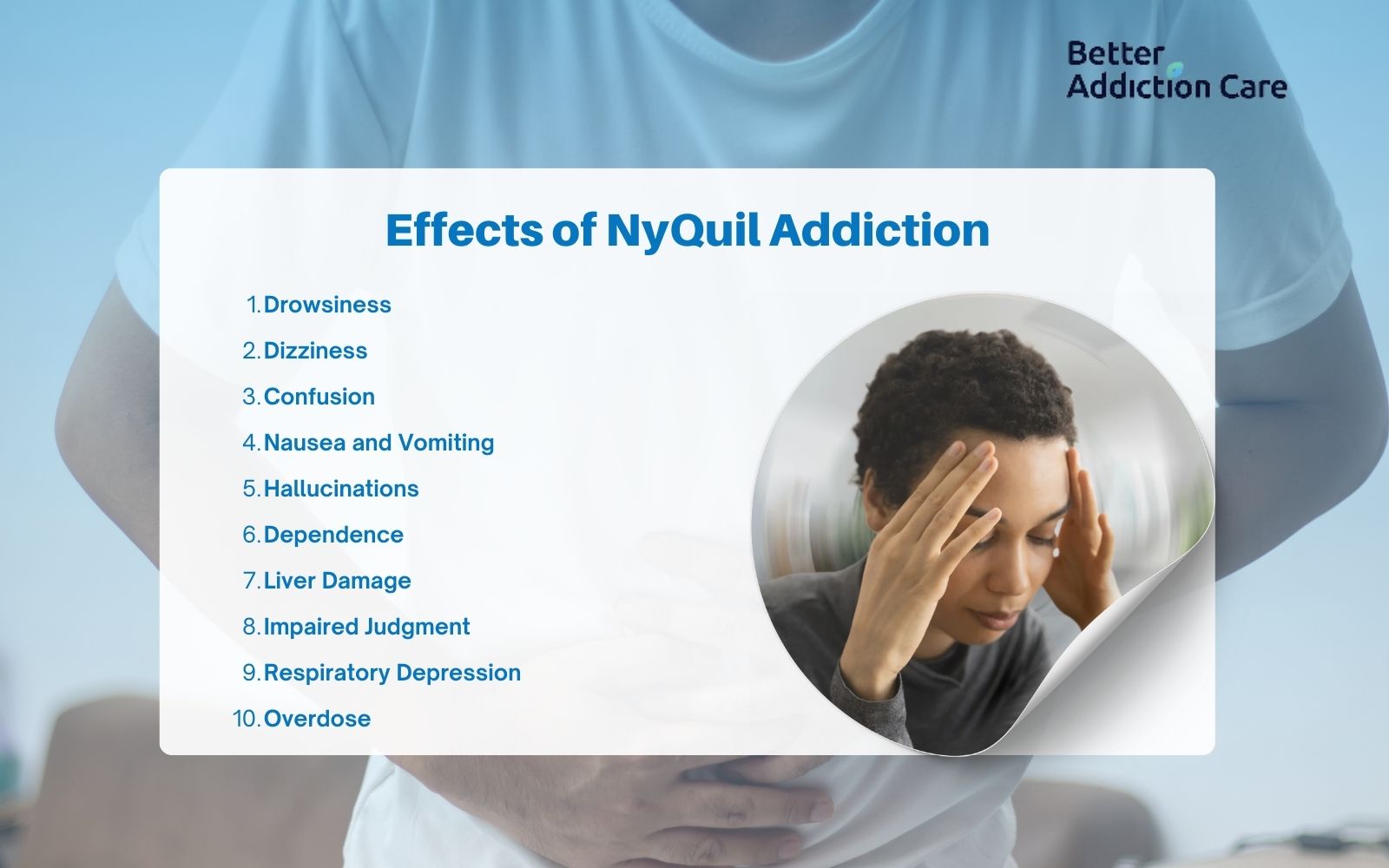
The main effects of NyQuil addiction are explained below:
-
Drowsiness: Excessive sedation or sleepiness is a common effect of NyQuil due to its diphenhydramine content. This is a severe physical symptom, impairing daily activities and reaction times.
-
Dizziness: This physical symptom is commonly associated with the sedative effects of NyQuil, especially when taken in higher doses. Dizziness interferes with balance and coordination. According to the National Institute on Drug Abuse (2021), dizziness indicates the misuse of NyQuil, especially when combined with other substances.
-
Confusion: Users experience mental confusion or fogginess due to the psychoactive effects of diphenhydramine. This is a psychological effect and impairs decision-making and cognitive function.
-
Nausea and Vomiting: These physical symptoms result from excessive use of NyQuil, particularly due to the acetaminophen and other inactive ingredients. These symptoms signal a toxic reaction or overdose. The National Institutes of Health (2021) advises caution when using NyQuil, as excessive acetaminophen intake causes severe gastrointestinal distress.
-
Hallucinations: Hallucinations occur when NyQuil is abused, primarily due to high doses of dextromethorphan. This is a psychological symptom and is severe, leading to dangerous behaviors. According to the National Institute on Drug Abuse (2021), the misuse of DXM causes distorted perceptions and disorientation, significantly affecting mental health.
-
Dependence: Psychological and physical dependence develop with chronic misuse of NyQuil, as individuals rely on it for sleep or stress relief. This is a behavioral and psychological effect that leads to the need for professional treatment.
-
Liver Damage: Prolonged use of NyQuil, especially with its acetaminophen content, causes liver damage or even liver failure in severe cases. This is a physical effect and can be life-threatening. According to the National Institutes of Health (2021), acetaminophen overdose is a leading cause of liver failure in the United States.
-
Impaired Judgment: The sedative effects of NyQuil impair judgment and decision-making abilities. This is a behavioral symptom affecting an individual's ability to make safe choices while under the influence. The National Institute on Drug Abuse (2021) points out that impaired judgment increases the risk of accidents or risky behaviors.
-
Respiratory Depression: When taken in excessive amounts, NyQuil depresses the respiratory system, leading to slowed or shallow breathing. This is a severe physical symptom that can be life-threatening.
-
Overdose: Taking too much NyQuil leads to an overdose, which results in severe symptoms such as confusion, dizziness, and potentially life-threatening issues like liver failure or respiratory depression. The National Institutes of Health (2021) emphasizes that overdosing on NyQuil, particularly due to acetaminophen, leads to irreversible liver damage.
How Long Do the Effects of Nyquil Last?
The effects of Nyquil last for 4-6 hours, although residual drowsiness or grogginess may persist for up to 8 hours, depending on individual factors.
The effects of NyQuil begin within 15–30 minutes after ingestion and peak within 1–2 hours. The National Institute on Drug Abuse (2021) states that the onset of NyQuil’s effects typically occurs within 30 minutes of ingestion and that the drug’s peak effects are experienced within 1–2 hours.
Several variables influence the duration of the effects, including the dosage taken, individual metabolism, and whether other substances, such as alcohol, were consumed alongside NyQuil.
The timeline of Nyquil is explained below:
-
Onset of Effects: Begins within 15–30 minutes after ingestion as the body absorbs the active ingredients. The sedative and pain-relieving effects typically start within this time frame.
-
Peak Effects: Reached within 1–2 hours, with the maximum sedative and pain-relieving effects experienced during this period.
-
Total Duration: This lasts approximately 4–6 hours, during which the medication effectively relieves symptoms like coughing, congestion, and body aches.
-
Residual Effects: Drowsiness or grogginess may persist for up to 8 hours, especially in those who have taken a larger dose or have slower metabolism rates.
What Risk Factors Contribute to NyQuil Addiction?
The risk factors that contribute to NyQuil addiction are a history of substance abuse, self-medication for stress or sleep issues, and mental health conditions such as anxiety or insomnia. Additionally, genetics play a role, as some individuals are more predisposed to addiction due to inherited traits.
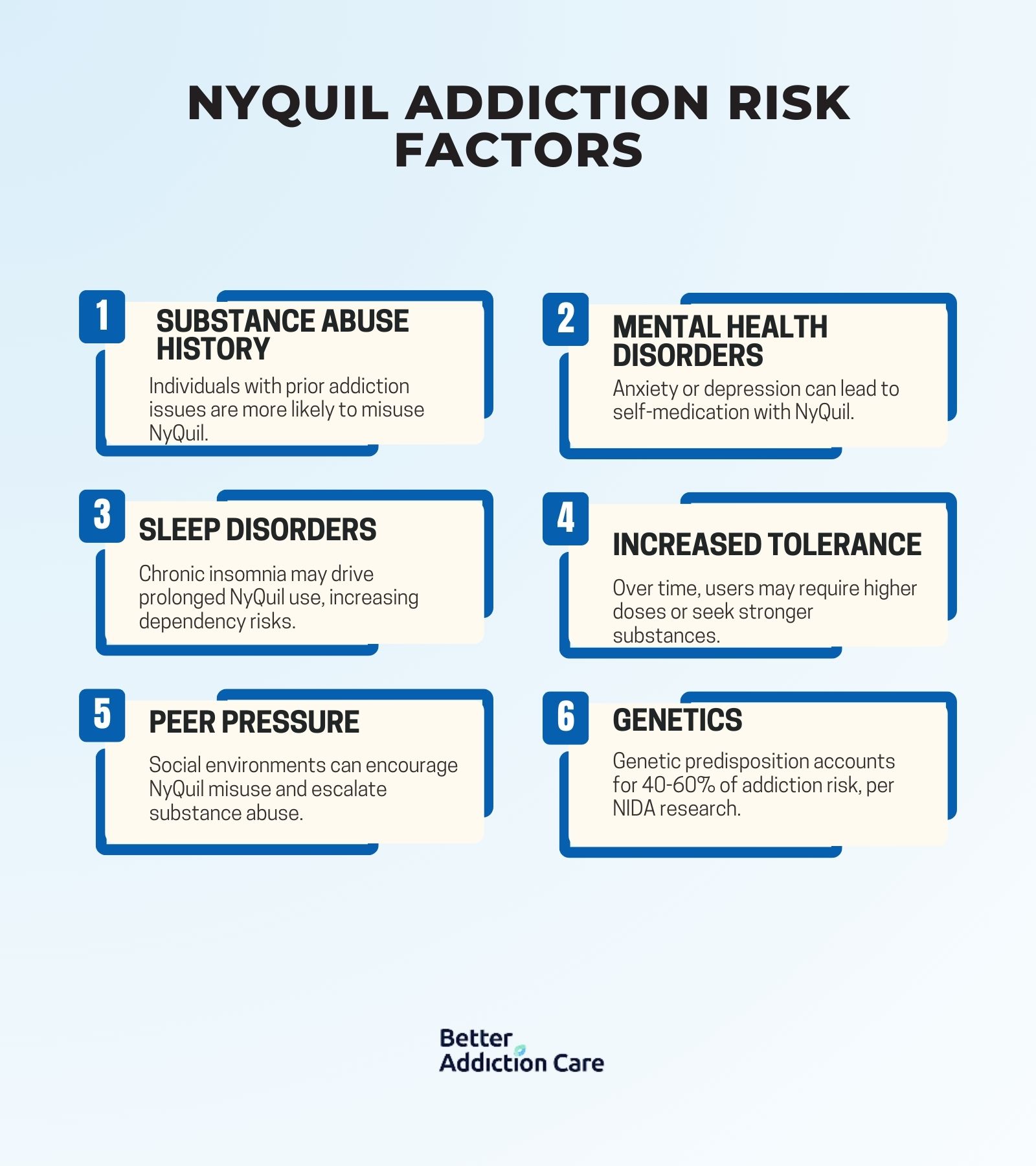
The risk factors that contribute to Nyquil addiction are explained below:
-
Substance Abuse: Individuals with a history of substance abuse are more likely to misuse NyQuil and other drugs, leading to the development of additional dependencies. According to the National Institute on Drug Abuse (2021), approximately 50% of individuals with a history of substance abuse are at increased risk of developing multiple addictions.
-
Mental Health Disorders: Those who struggle with mental health issues, such as anxiety or depression, use substances like NyQuil to self-medicate.
-
Sleep Disorders: Individuals with chronic insomnia or sleep disturbances turn to NyQuil for relief, which escalates into dependency.
-
Increased Tolerance: As tolerance to NyQuil builds over time, individuals begin to seek out stronger substances to achieve the same effects.
-
Peer Pressure: Peer influence, especially in social or high-risk environments, encourages the misuse of NyQuil, potentially leading to the use of other illicit substances.
-
Genetics: Genetic factors play a significant role in the likelihood of developing substance use disorders, including addiction to NyQuil and other drugs. Research from the National Institute on Drug Abuse (2021) shows that genetic predisposition accounts for about 40-60% of the risk for addiction.
Can NyQuil Addiction Lead to Other Substance Use Disorders?
Yes, NyQuil addiction can lead to other substance use disorders. When individuals develop a dependency on NyQuil, they begin seeking stronger substances to achieve similar effects, particularly as tolerance builds.
NyQuil contains dextromethorphan (DXM), which produces euphoric or hallucinogenic effects when abused, making individuals more likely to turn to other substances that provide a similar high.
The National Institute on Drug Abuse (2021) emphasizes that substance abuse co-occurs, with individuals who abuse one substance being at higher risk of abusing others as well.
Can Nyquil be Addictive if Used as Directed?
No, NyQuil is generally not addictive if used as directed. The key ingredients in NyQuil, such as diphenhydramine, acetaminophen, and phenylephrine, are safe when taken at the recommended doses for short-term use.
However, abuse occurs when individuals misuse the medication to achieve sedative effects or for self-medication, particularly when they take it in larger amounts than recommended. The sedative effects of diphenhydramine may make it tempting to misuse, but if used according to the package instructions, NyQuil does not typically lead to addiction.
The National Institute on Drug Abuse (2021) emphasizes that addiction often develops from misuse, such as taking excessive doses or using the drug for purposes other than those intended. According to the Mayo Clinic (2022), following recommended dosages minimizes the risk of developing dependence on over-the-counter medications like NyQuil.
How is NyQuil addiction diagnosed?
NyQuil addiction is diagnosed through a clinical evaluation, which includes psychological assessment and behavioral observation. Healthcare providers use a self-assessment quiz, withdrawal symptom monitoring, and diagnostic criteria analysis to determine the presence of addiction, consulting with addiction specialists for further evaluation.
Ways nyquil addiction is diagnosed are explained below:
-
Self-Assessment Quiz: Individuals use self-assessment quizzes to identify signs of addiction, helping them evaluate the severity of their dependence. This is the first step in recognizing the need for professional help.
-
Clinical Evaluation: A healthcare provider conducts a thorough clinical evaluation, which includes a physical examination, interviews, and a review of the individual’s history of substance use. This evaluation helps determine the severity of the addiction.
-
Psychological Assessment: A psychological assessment is used to identify any underlying mental health disorders that are contributing to the addiction. This helps adapt the treatment plan to address both addiction and mental health. According to the National Institutes of Health (2021), psychological assessments are vital for understanding the root causes of addiction and providing effective treatment.
-
Diagnostic Criteria Analysis: Addiction is diagnosed based on the Diagnostic and Statistical Manual of Mental Disorders (DSM-5), which provides criteria for substance use disorders. This analysis ensures a standardized and accurate diagnosis.
-
Behavioral Observation: Behavioral observation helps track an individual’s actions and symptoms, providing insight into how their addiction manifests in everyday life. This method is crucial for understanding patterns of misuse.
-
Withdrawal Symptom Monitoring: Monitoring withdrawal symptoms is essential in managing detoxification and ensuring safe recovery. Symptoms such as anxiety, insomnia, and irritability are closely monitored during the early stages of treatment.
-
Consultation with Addiction Specialists: Consultation with addiction specialists ensures that individuals receive expert guidance and support throughout the recovery process. Specialists provide personalized treatment plans and counseling to aid in recovery.
What are the Treatment Options for NyQuil Addiction?
The common treatments for NyQuil addiction include detoxification, behavioral therapy, and counseling to address both the physical and psychological aspects of addiction. Support groups, inpatient rehab, outpatient programs, medication management, and lifestyle changes are also effective in helping individuals recover and maintain long-term sobriety.
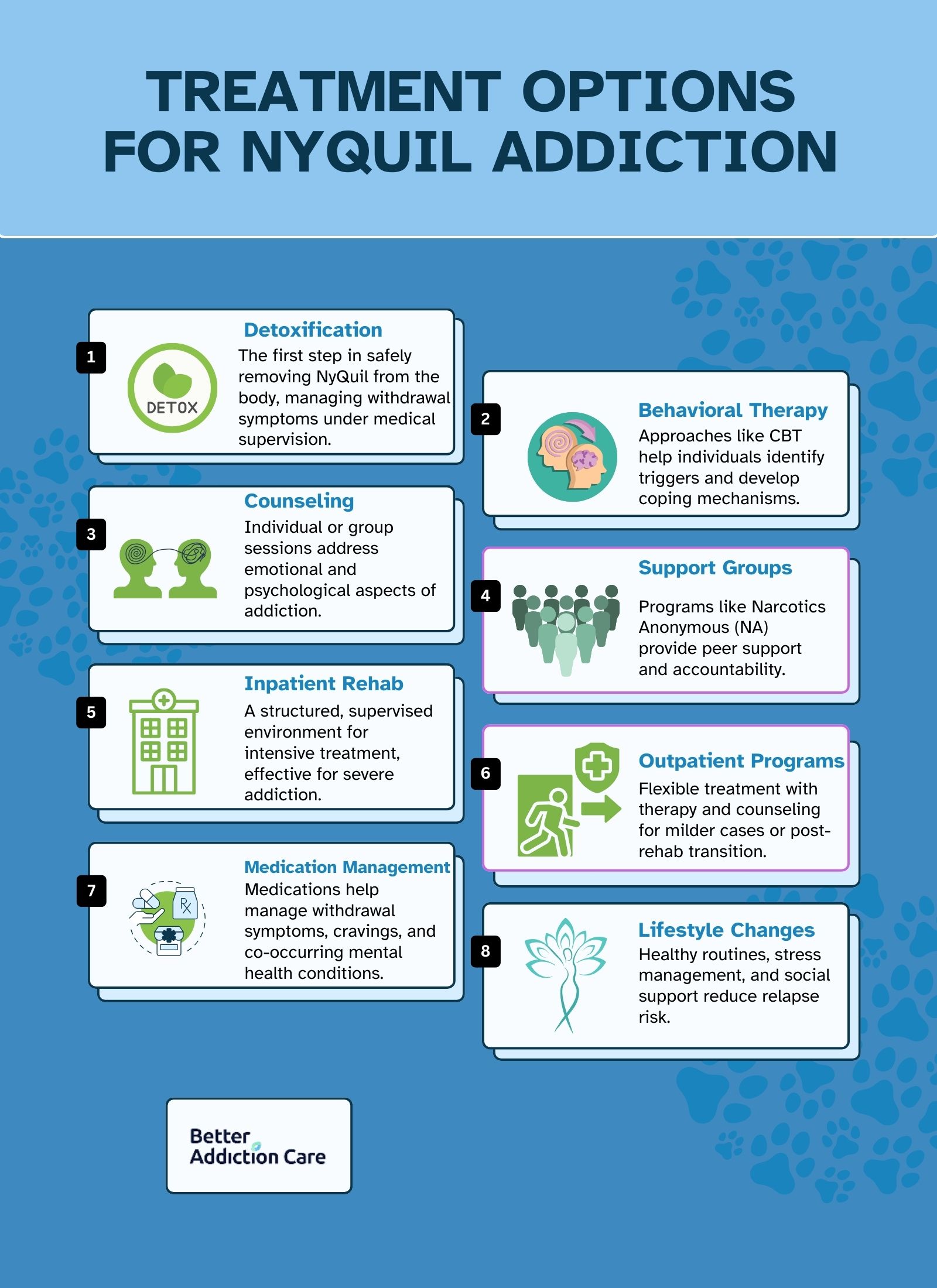
The treatment options for Nyquil addiction include the following:
Detoxification
Detoxification is the first step in treating NyQuil addiction, aiming to rid the body of the drug safely. It is essential for those with physical dependence, as it helps manage withdrawal symptoms in a controlled environment.
Detoxification is effective in stabilizing the patient and is followed by more extensive treatment. The National Institute on Drug Abuse (2021) states that detoxification is a critical first step in treating substance use disorders to ensure a safe withdrawal process.
Behavioral Therapy
Behavioral therapy is a cornerstone of addiction treatment, focusing on changing unhealthy behaviors and thought patterns associated with substance misuse. Cognitive Behavioral Therapy (CBT) and other modalities help individuals identify triggers and develop coping mechanisms. According to the National Institutes of Health (2021), behavioral therapies like CBT are highly effective in treating addiction by addressing the psychological aspects of dependency.
Counseling
Individual or group counseling is an essential part of treatment, providing emotional support and addressing underlying mental health issues such as anxiety or depression. Counseling helps individuals learn strategies for maintaining sobriety and improving their overall well-being.
Support Groups
Support groups, such as Narcotics Anonymous (NA), provide a community environment for individuals recovering from addiction. These groups offer emotional support and shared experiences, helping individuals stay accountable.
Support groups are proven to increase long-term recovery success by providing peer support. According to the National Institute on Drug Abuse (2021), participation in support groups significantly improves recovery outcomes by fostering accountability and peer encouragement.
Inpatient Rehab
Inpatient rehabilitation is a comprehensive treatment option where individuals stay at a facility for intensive treatment and support. It is particularly effective for those with severe addiction, offering a structured environment with medical supervision. Inpatient rehab programs are highly effective in managing withdrawal and reducing relapse rates.
Outpatient Programs
Outpatient programs offer flexibility, allowing individuals to receive treatment while living at home. These programs provide therapy, counseling, and support services and are effective for those with less severe addiction or those transitioning from inpatient care.
Medication Management
Medication management involves the use of medications to help manage cravings and withdrawal symptoms, making it easier for individuals to focus on recovery. Medications like antidepressants or anti-anxiety drugs are prescribed alongside behavioral therapy. According to the National Institute on Drug Abuse (2021), medication management can support recovery by reducing cravings and preventing relapse in those with substance use disorders.
Lifestyle Changes
Incorporating lifestyle changes, such as developing healthy routines and building a support network, is crucial for maintaining sobriety long-term. These changes are effective in preventing relapse by helping individuals manage stress and avoid triggers.
What are the withdrawal symptoms of NyQuil addiction?
The withdrawal symptoms of NyQuil addiction include irritability, insomnia, anxiety, and physical discomforts such as headaches or nausea. In more severe cases, individuals also experience tremors, sweating, and elevated heart rate.
The most common withdrawal symptoms are explained below:
-
Anxiety: Increased feelings of nervousness or worry as a result of the body adjusting to the absence of the drug’s sedative effects. This is a psychological symptom that is severe, impacting daily life.
-
Insomnia: Difficulty sleeping or staying asleep due to the body no longer relying on NyQuil’s sedative properties. This is a physical and psychological symptom that leads to significant distress if not managed.
-
Nausea: A feeling of queasiness or an upset stomach that occurs when the body reacts to the absence of NyQuil’s ingredients, especially acetaminophen and diphenhydramine. This is a physical symptom and ranges from mild to severe.
-
Sweating: Increased perspiration as the body experiences withdrawal. Sweating is a physical symptom of the body trying to normalize after the cessation of NyQuil use.
-
Irritability: Short tempers and mood swings due to the discomfort of withdrawal and the absence of NyQuil’s calming effects. This is a psychological symptom that significantly affects interactions with others.
-
Restlessness: An inability to sit still or feel at ease, caused by anxiety or the body’s reaction to not having its usual sleep aid. This is a psychological symptom and leads to difficulty in completing everyday tasks.
-
Fatigue: Extreme tiredness or lack of energy due to disrupted sleep patterns caused by the withdrawal of NyQuil. This is a physical symptom and impairs daily functioning.
-
Cravings: A strong desire to use NyQuil again, particularly as a means to manage anxiety, insomnia, or discomfort. This is a psychological symptom that contributes to relapse if not addressed.
-
Tremors: Uncontrolled shaking, typically in the hands, which occurs as the nervous system adjusts to the absence of NyQuil. This is a physical symptom and is distressing, particularly during the early stages of withdrawal.
-
Mood Swings: Sudden changes in mood, ranging from irritability to depression, as the body and mind cope with the withdrawal process. This is a psychological symptom and significantly affects relationships and overall well-being.
How to prevent NyQuil addiction?
To prevent NyQuil addiction, it is necessary to follow recommended dosages and only use the medication when necessary for managing cold or flu symptoms. Prolonged use of NyQuil, especially for sleep aid purposes, leads to dependency, so it should be used sparingly.
If symptoms persist, consulting a healthcare professional is crucial to avoid self-medicating, and they recommend appropriate alternatives for long-term relief.
Additionally, avoiding mixing NyQuil with alcohol or other substances is important, as this increases the risk of misuse and dependency. By adhering to these precautions, individuals can prevent the development of addiction while ensuring the safe use of NyQuil.
According to the National Institute on Drug Abuse (2021), following recommended dosages and consulting a healthcare provider are critical to preventing misuse of over-the-counter medications like NyQuil.
Why Does Nyquil Make You Sleepy?
NyQuil makes you sleepy primarily due to the presence of doxylamine succinate, an antihistamine that causes drowsiness by blocking histamine receptors in the brain. Additionally, the alcohol content in NyQuil enhances its calming effects, further promoting relaxation.
This combination slows down brain activity and reduces neural processes, making it easier for individuals to fall asleep and stay asleep. The sedative effects of NyQuil are quickly felt, typically within 30 minutes of ingestion, providing fast relief for those seeking rest due to cold or flu symptoms.
According to the National Institute on Drug Abuse (2021), antihistamines like doxylamine succinate are commonly used in over-the-counter medications to induce sleep.
Can You Overdose On Nyquil?
Yes, it is possible to overdose on NyQuil, mainly due to the acetaminophen and dextromethorphan (DXM) it contains. An overdose of NyQuil leads to severe health complications, such as liver damage from acetaminophen and respiratory depression from DXM.
The recommended dose of NyQuil is typically 30 mL for adults every 6 hours, but taking higher doses can overwhelm the liver and central nervous system. Ingesting large amounts of NyQuil in a short period, especially in combination with alcohol or other sedatives, increases the risk of a potentially fatal overdose.
The National Institute on Drug Abuse (2021) states that acetaminophen overdose is one of the leading causes of liver failure in the U.S., and misuse of DXM results in dangerous side effects such as hallucinations and slowed breathing.
How Much Nyquil is Too Much?
The amount of Nyquil that is too much is over 30 ml every 6 hours. Taking more than the recommended dose of NyQuil leads to serious health complications, including liver damage, respiratory issues, sedation, and overdose.
Consuming more than four doses in 24 hours or combining NyQuil with other substances like alcohol significantly increases the risk of overdose. The National Institutes of Health (2021) advises that exceeding the recommended dose of acetaminophen, a key ingredient in NyQuil, leads to severe liver damage and other dangerous symptoms.
How Much Alcohol is in Nyquil?
NyQuil contains about 10% alcohol by volume in its liquid form, which is primarily used to help dissolve and stabilize the ingredients. While this amount seems small, it enhances the sedative effects of the medication, especially when taken in higher doses or combined with other depressants like alcohol.
The alcohol content in NyQuil also contributes to drowsiness and impaired judgment, making it dangerous to operate machinery or drive while under its influence. According to the National Institute on Drug Abuse (2021), alcohol in medications like NyQuil enhance their sedative effects and increase the risk of misuse.
What is The Difference Between Nyquil Addiction and Codeine Addiction?
The main difference between NyQuil addiction and codeine addiction is that NyQuil leads to dependence through sedative and psychoactive effects, while codeine is an opioid that directly affects the brain’s opioid receptors, making it highly addictive.
Codeine addiction is more physically dangerous due to the risk of respiratory depression and overdose, which is a significant concern with opioid abuse.
On the other hand, NyQuil addiction is often associated with misuse for its sleep-inducing effects rather than for achieving a high.
According to the National Institute on Drug Abuse (2021), approximately 4.3 million people in the U.S. misuse prescription opioids like codeine annually.
What is The Difference Between Nyquil Addiction and Alcohol Addiction?
The main difference between NyQuil addiction and alcohol addiction is that NyQuil is an over-the-counter medication, while alcohol is a legal and widely available substance that directly affects the central nervous system.
While both substances lead to dependence through their sedative effects, alcohol addiction is more likely to result in severe long-term health issues, such as liver disease and cardiovascular problems.
NyQuil addiction, on the other hand, is linked to misuse of the sedative properties, though it still leads to liver damage due to acetaminophen and neurological issues from DXM.
According to the National Institute on Alcohol Abuse and Alcoholism (2021), approximately 14.5 million people in the U.S. struggle with alcohol use disorder, a number much higher than the prevalence of NyQuil addiction.
What Drugs Have Negative Interactions with Nyquil?
NyQuil interacts negatively with several drugs, such as opioids, benzodiazepines, alcohol, and blood thinners. These drugs enhance nyquil’s sedative effects or cause dangerous side effects. The following drugs should be avoided or used with caution when taking NyQuil:
-
MAOIs: Monoamine oxidase inhibitors cause severe reactions when combined with NyQuil, leading to dangerously high blood pressure.
-
Benzodiazepines: When taken with NyQuil, benzodiazepines increase drowsiness and the risk of respiratory depression.
-
Opioids: Combining NyQuil with opioids leads to extreme sedation, respiratory issues, and an increased risk of overdose.
-
Alcohol: Alcohol enhances the sedative effects of NyQuil, increasing the risk of liver damage, drowsiness, and impaired judgment.
-
Blood thinners: NyQuil interferes with the effectiveness of blood thinners, potentially leading to bleeding complications.
-
Antihistamines: Combining NyQuil with other antihistamines leads to excessive sedation and impaired cognitive and motor function.
What Does a Nyquil High Feel Like?
Nyquil high feels pleasant at first but also causes hallucinations at a higher dose. These effects are due to the dextromethorphan (DXM). Nyquil high leads to tolerance and dependence. The National Institute on Drug Abuse (2021) reports that misuse of DXM is a growing issue, with many individuals using it to achieve these psychoactive effects.
How Long Does it Take to Get Addicted to Nyquil?
The time it takes to become addicted to NyQuil varies depending on the individual, but addiction can develop quickly if the drug is misused regularly. Frequent misuse, especially for its sedative effects, leads to tolerance and dependence within a few weeks or months, particularly if larger doses are taken.
According to the National Institute on Drug Abuse (2021), addiction to over-the-counter medications like NyQuil occurs faster in individuals with a history of substance abuse.
How Long Does Nyquil Stay in Your System?
NyQuil stays in your system for 4–6 hours, depending on the dosage and individual metabolism. However, some of the ingredients, like acetaminophen, remain in the body longer, especially in those with slower metabolisms.
The sedative effects of NyQuil also last longer in individuals who misuse the drug. According to the National Institute on Drug Abuse (2021), the active ingredients in NyQuil affect the central nervous system for several hours, and misuse extends the duration of its effects.
Is Nyquil Bad For You?
NyQuil is not generally bad for you. It is safe when used as directed for short-term relief of cold and flu symptoms. However, misuse or long-term use leads to serious health risks, such as liver damage from acetaminophen or dependence on the sedative effects of diphenhydramine. The National Institute on Drug Abuse (2021) highlights that misuse of NyQuil for its psychoactive effects leads to significant physical and psychological harm.
Is it Bad to Take Nyquil Every Night?
Yes, it is bad to take NyQuil every night, as it leads to dependence on the sedative effects of the medication and potential liver damage due to the acetaminophen content. Regular use of NyQuil for sleep disrupts natural sleep patterns and causes you to rely on the drug for rest, increasing the risk of long-term physical and psychological issues.
Is Nyquil Addiction a Drug Addiction?
Yes, Nyquil addiction is considered a drug addiction because it involves the compulsive misuse of an over-the-counter medication containing substances like dextromethorphan (DXM), which causes psychoactive effects when consumed in high doses.
Nyquil's addiction meets the DSM-5 criteria for substance use disorder, including symptoms like increased tolerance, withdrawal symptoms, and continued use despite harm. The abuse of Nyquil, particularly for its sedative or hallucinogenic effects, aligns with behaviors observed in other drug addictions.
According to the National Institute on Drug Abuse (NIDA), approximately 10% of Americans over the age of 12 have misused over-the-counter or prescription medications in their lifetime, emphasizing the scope of drug addiction in the U.S.


